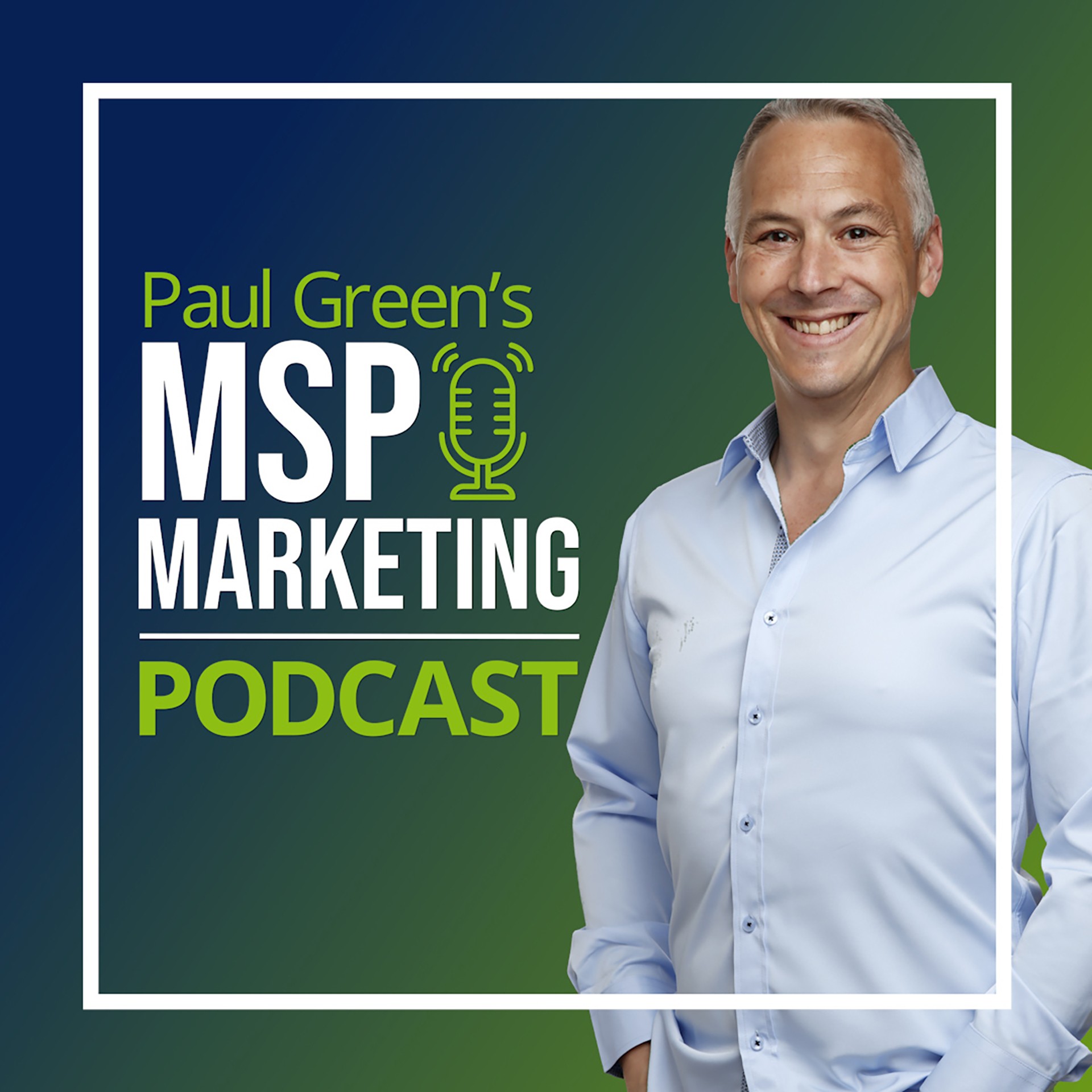Why MSPs procrastinate (and how to cure it)
Description
The podcast powered by the MSP Marketing Edge
Welcome to Episode 264 of the MSP Marketing Podcast with me, Paul Green. This week…
- Why MSPs procrastinate (and how to cure it): Don’t confuse busyness with business. Keeping yourself busy doing things that you really shouldn’t be doing, at the expense of the things that matter is a form of procrastination.
- What technicians write in tickets can damage your brand: Your brand is YOU, and your team, and the way you communicate. And critically… how that makes people feel.
- Why successful MSPs use PowerPoint to tell stories: Eliminate death by PowerPoint using story telling to simplify complex information and help your presentations come to life.
- Paul’s Personal Peer Group: Want to fire a problematic client but don’t know how? I have the answer…
Why MSPs procrastinate (and how to cure it)
One of the dangers of doing a podcast every week and appearing in lots of YouTube videos is that at some point your friends and family stumble across your content. And every now and then I get a message from a friend saying, Hey, I just watched your latest video on YouTube, I’ve no idea what you were talking about Paul, but it seemed okay. Now, the reason that this is a risk is because I do try and put a lot of my life into my content, because as a working parent and a business owner myself, that helps you and me to relate to each other. So the story I want to tell you today is about a friend who I hope never stumbles across this recording because I know he will recognise himself immediately and no one likes to be talked about in a negative way.
Now, this friend of mine runs his own business. Don’t worry, he’s not an MSP. In fact, what he does is almost irrelevant, but times sadly are not very good for him right now. He’s lost a lot of clients over the last few years and his business is not in great shape. We do occasionally talk about marketing. Of course, I give him as much advice as I can, but he rarely takes action on it. I think the problem is that he hasn’t yet emotionally dealt with the fact that a business that he’s been building up for decades has flattened out. In fact, it’s in decline now. He needs to do things differently to rescue it and turn it around.
If you were in a situation like this where you’re actually struggling to meet payroll in some months, you’d think that your full attention would be on the rescue and the recovery, right? I mean, that would certainly be the case for me, but not for my friend because the other day when we were chatting and I asked what he was doing that day, he said he was going on a training course. Not a training course on anything that would be useful to him in terms of turning his business around or improving the service. It was a very low level training course around some minor changes to regulations regarding the service that he sells. So really, he could have just sent one of his staff or just skipped it altogether. It really wasn’t an important training course, but it was an entire day of his time.
I was utterly gobsmacked when he told me about this because just a few days before, he was telling me that he didn’t have any time to implement all of the new marketing ideas that we discussed to help him win new clients. And then I had an epiphany. Him going on a training course was a form of procrastination. My friend had confused busyness with business. To him going on a training course, was doing some work, but the reality is it wasn’t productive work. It was just him passing the time and maybe not even having to think about his problems for a few hours. Maybe that was the appeal.
People think procrastination is about doing nothing when you should be doing something. But procrastination comes in the form of us doing things that we really shouldn’t be doing at the expense of doing the things that matter.
Now, I see this in marketing implementation all the time, and of course to an MSP, marketing is hard. It’s a dark art if you are actually a technical person, anything that’s hard is at risk of being held back through procrastination. Do you have this problem?
Well, let me tell you what I’ve just agreed with my friend to see if this would help you. I took him out for a beer. I told him in a much gentler manner than I’ve told you how I thought he was procrastinating and then I agreed to be his accountability buddy. So what we’re going to do, we’re going to start this next week. We’re going to have a brief chat at the start of every week where he tells me about a couple of tasks he’s going to do to win new clients. So the tasks that he wants to implement that week. He’ll tell me about them at the start of the week and then at the end of the week, he has to give me a progress report. Now, as I say, we’re only going to start next week and I think it’s going to go well because what I think is going to happen is every time my friend catches himself procrastinating, he will remind himself that he doesn’t want to be on a phone call with me at the end of the week admitting he didn’t get those two or three tasks done. Now, I don’t care whether he gets them done or not, but internally to him, it’s very important that he gets those done.
This is one of the core psychological weapons of influence as outlined by Dr. Robert Cialdini in his classic book, which is called Influence. The weapon is called commitment and consistency. When we say we’re going to do something, we want to be very consistent with following through and doing that because to be seen to do that is an important part of our self-image. So just by getting my friend to declare what he’s going to do and then holding him to account for that, he’s getting stuff done. And I know that he’s going to start to win new clients soon by implementing new marketing and he will rescue his business, which is fantastic. What a great thing that I can do to help him for just an investment of, 10, 15 minutes a week. Would this work for you?
If you are struggling to get your marketing implemented, why not find yourself an accountability buddy? Now sadly, I can’t personally do it with you, but I bet you could find another MSP or just indeed another business owning friend, and it definitely needs to be someone who is a business owner and understands your world because then they won’t let you use the usual interruptions of, oh, we had a busy week as an excuse for not getting things done. If you do try this, will you let me know? I would love to see some examples of this being done successfully by MSPs.
What technicians write in tickets can damage your brand
Being a marketing expert is a little bit like being an IT expert. It’s a very broad canvas and just as you might be good at many things, but not blowing fluff out of an RS 232 port, I’m good at many marketing subjects, but not all of them.
You’ll rarely hear me giving detailed advice on pay per click or search engine optimisation, SEO, as they’re very technical subjects that change constantly. Another area I’ve never really been comfortable discussing is branding. But recently I’ve been interviewing some very smart branding experts for future episodes of my podcast and it’s helped me get a better grip on what branding really is.
It’s not your logo, it’s not the design of your website, it’s not your accreditations. Your brand is YOU and YOUR TEAM and the way that you COMMUNICATE.
And critically how all of that makes people feel. Because that’s really what a brand is. It’s the reflection of how people feel about something. Their feelings affect whether they buy or not. Most purchases are driven by the heart rather than by the brain, especially picking a new MSP.
So let’s take some big consumer brands. How do you feel about Microsoft, about Apple, about Coke or Pepsi? You’ll have negative or positive feelings towards these brands based on your past experiences with them. And of course, these big consumer brands, they spend millions every year to influence you. Well really a B2B brand like your MSP is no different, except you are not spending advertising dollars to try to change people’s emotional response to you and neither should you.
The way that people feel is based on every possible kind of communication you do. That includes what’s on your website, what you say on social media, the blogs and the articles you write and the videos that you make. But it’s also affected by how the phone is answered, the way your technicians talk on live chat, what’s written in tickets. You see your brand is everything you do. And so the only way to influence that brand perception is to create the right culture within your business. Because you can’t control freak everything every technician says every day, and you don’t really want to, right? That’s the route to divorce and a heart attack. But you can set out what your MSP’s mission is and constantly train and encourage your team to serve that mission with everything they do.
As an example, my MSP Marketing Edge’s mission is to make marketing and winning new clients easy for MSPs. And I have a team of 12 and a constant focus on this mission in all of our internal conversations, which allows my team to make the correct decisions every day without having to refer back to me. So whatever a member of ours asks, my team can think If I do this or if I advise this does it make marketing easy for this MSP? And when you add that up over a thousand communications, it becomes a solid,










